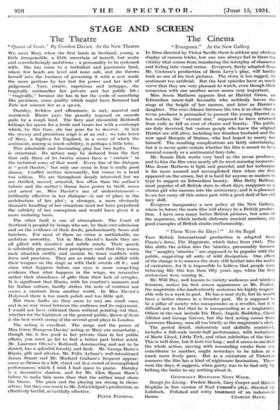STAGE AND SCREEN The Theatre
"Queen of S cots." By Gordon Daviot. At the New Theatre WE meet Mary when she first lands in Scotland, young, a little irresponsible, a little uncertain of herself, but acute and overwhelmingly ambitious : a personality to be reckoned with. She has come to a turbulent and passionate land, where few heads are level and none safe, and she throws herself into the business of governing it with a zest made the more perilous by her lust for power and her lack of judgement. Vain, erratic, capricious and unhappy, she tragically mishandles her private and her public life ; " tragically," because she has in her the seeds of something like greatness, some quality which might have flowered had Fate not miscast her as a queen.
Darnley, feckless and effeminate, is met, married and murdered. Rizzio pays the penalty imposed on smooth guile by a rough land. The fiery and irresistible Bothwell kidnaps his queen for a bride and treats her with a contempt which, by this time, she has gone far to deserve. At last the stormy and precarious reign is at an end ; we take leave of Mary, a fugitive for England, in a scene of which the sentiment, among so much subtlety, is perhaps a little trite.
This admirable and fascinating play has two faults. One is structural. Its nature may be deduced from the - fact that only three of its twelve scenes have a " curtain " in the technical sense of that word. Every line of the dialogue is " good theatre," but only one scene in four is really good drama. Conflict seethes incessantly, but comes to a head too seldom. We are throughout deeply interested, but we are thrilled, moved, arrested, less often than the author's talents and the author's theme have power to thrill, move and arrest' us. Miss Daviot's use of understatement— brilliantly effective in her dialogue—is out of place in the architecture of her plot ; a stronger, a more obviously dramatic handling of her situations need not have prejudiced the subtlety of her conception and would have given it a more enduring basis.
The other fault is one of atmosphere. The Court of Scotland is peopled by beings who are, by their own admission and on the evidence of their deeds, predominantly boors and butchers. For most of them no crime is unthinkable, no ambition unworthy. Yet in Miss Daviot's hands they are all gifted with sensitive and subtle minds. Their speech is admirably pregnant, their percipience such that they assess each situation swiftly and sustain its inner conflicts with force and precision. They are as ready and as skilful with their tongues on the stage as with their swords off it ; and since what happens before our eyes is more compelling evidence than what happens in the wings, we remember rather their abundance of gifts than their lack of scruples. It is significant that Rizzio, with his courtier's manners and his Italian culture, hardly strikes the note of contrast nor seems a creature from another world. In Miss Daviot's Holy-rood there is too much polish and too little spit.
But these faults (as they seem to me) are small ones, and in no way stand between the audience and its enjoyment. I would not have criticized them without pointing out that, whether for the highbrow or the general public; Queen of Scots is the best worth seeing of the several good plays in London.
The acting is excellent. The range and the power of Miss Gwen ffrangcon-Davies' acting as Mary are remarkable though she is less good in her private than in her public affairs, you must go far to fmd a better part better acted. Mr. Laurence Olivier's Bothwell, domineering and not to be denied, has a splendid ferocity and dash. Mr. George Howe's Rizzio, glib and ulterior, Mi. Felix Aylmer's well-intentioned James Stuart and Mr. Morland Graham's frequent appear- ances as Demos in a kilt, stand out in a crowd of accomplished performances which I wish I had space to praise. Darnley is a decorative shadow, and for Mr. Glen Byam Shaw's failure to make him more than that the author must shaie the blame. The piece and the playing are strong in them- selves; but they owe much to Mr. John Gielgud's production, so effectively tactful, so tactfully effective.
PETER PLE]IIsG.
















































 Previous page
Previous page